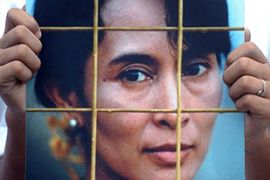Myanmar polls set for November
Critics say elections to be held on November 7 aimed at tightening military rule.

“Given the oppressive political environment in Burma, there is not a level playing field for these elections,” Philip Crowley, the US state department spokesman, said, using the previous name for Myanmar.
Banned party
Suu Kyi’s National League for Democracy party (NLD), officially banned after it missed the deadline to be re-registered, is not taking part the polls.
Its officials say newly-framed rules would in effect have forced it to expel Suu Kyi and other members in prison, making it hard for them to take part in the elections.
| In depth |
|
|
The election falls just days before Suu Kyi’s latest term of house arrest is due to expire on November 13.
The spokesman for her party said the date was too soon to allow sufficient time for party campaigning.
“Without freedom of media or expression, the elections cannot be either free or fair,” Nyan Win said.
The party was disbanded in May because it refused to register.
On Wednesday, state television announced that the election commission, the governing body for the polls, had designated constituencies for the two-chamber national parliament, as well as regional parliaments.
The 440-member House of Representatives will have 330 elected civilians and 110 military representatives, while the 224-member House of Nationalities will seat 168 elected candidates and 56 nominated by the military chief.
‘Intimidation’
However, several parties which plan to run in the polls are already critical of the official process.
|
“There may be some possibility for an anti-junta vote, however the outcome of the election is bound to be pro-junta.” Larry Jagan, a Southeast Asia expert. |
Forty political parties have registered to contest the elections, and six others are awaiting approval to run.
The leader of the Democratic Party said that they had complained to the election commission that police are intimidating its members.
Police visited party members’ homes in Yangon and asked for personal data and photographs, Thu Wai, the party’s chairman, said.
“This amounts to intimidation. Party members don’t want to deal with the police and some members could resign for fear of harassment.”
Phyo Min Thein, a former political prisoner, resigned as head of the Union Democratic Party (UDP) last week and said he would not participate in the election.
‘Vote buying’
Larry Jagan, a Southeast Asia expert, told Al Jazeera that it was impossible to have a free and fair vote.
“There is little doubt about intimidation and the buying of votes,” Jagan said.
“Several opposition politicians have been picked up by the police recently and questioned.
“However, while the NLD may have felt the situation was unacceptable, they have [also] condemned anyone who is running. I think that is a mistake.
“I suspect the vote on the day will be free, it was in 1990 … and so there is a possibility that anyone who is anti-government will look for parties that are not closely associated with the junta.”
A 2008 constitution adopted as part of a “roadmap to democracy” stipulates that 25 per cent of parliamentary seats go to the military. It stipulates that no amendments to the charter can be made without the consent of more than 75 per cent of politicians.
Suu Kyi has spent 15 of the past 21 years in detention and remains under house arrest, while more than 2,000 political prisoners are behind bars.
